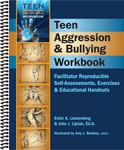 The talented Taylor Swift has a great song called Mean, with lyrics that include:
The talented Taylor Swift has a great song called Mean, with lyrics that include:
You, with your words like knives
And swords and weapons that you use against me
You have knocked me off my feet again
Got me feeling like I’m nothing…
Why you gotta be so mean?
We’ve all heard sad and horrible stories of bullying and cyber-bullying among kids and teens, but the fact is, for many, the bullying never stops. I believe that even those of us who were nicer once find it increasingly hard to avoid the mean-spiritedness that is too often the norm in today’s world. When I recently did an Internet search for “How to become less mean-spirited,” I found an online forum debating whether Internet users are more or less rude than they were in the past (there wasn’t a consensus, but many of the participants were rude in their comments about the subject), a host of articles on negative politics, and two online articles on how to become less sensitive. Maybe we’re not too sensitive; maybe people are just too mean.
It’s not hard to see why meanness has become so prevalent. Look at the role models we have these days:
- Many people start their days off by listening to mean-spirited people on talk radio or television. These “hosts” make it seem “normal” to demean callers and in-studio guests, to cut people off mid-sentence, and to shout in order to be heard over the din;
- Reality television goes for the drama by focusing on the basest, ugliest personalities, those who consider throwing a drink or a punch the go-to when circumstances don’t go their way; and
- The semi-anonymity that allows kids to cyber-bully is just as present for those of who are “grown up.” People online regularly call each other words that used to be considered the ultimate put-downs and say that they don’t mean anything by it—that those words have become part of everyday language and no longer carry the sting they used to. The list of common computer acronyms includes 182 (I hate you), DIAF (Die in a fire), DILLIGAS (Do I look like I give a s*#t?) and STBY (Sucks to be you), among others.
When Beaver Cleaver has been replaced by the South Park gang, is it any wonder we feel it hard to be nice? To prevent falling into the “meanie” trap, try some of these:
- Focus your jokes on yourself or situations and don’t mock other people in your life. Any time you say, “Can’t you take a joke?” you’ve slipped into mean-spiritedness.
- Put your shopping cart back where it belongs instead of leaving it in the middle of a parking spot.
- Leave the last donut or pizza slice for someone else.
- The next time someone calls you at dinnertime to ask you to switch phone companies or help with a survey, keep in mind that the person calling is just doing a job. Don’t take out your annoyance on them; instead, politely ask them to call you back later or take you off their list. Or use tactic #1: make ‘em laugh.
- Let a few cars enter the freeway in front of you.
- Learn the names of people you have regular interactions with at the gas station, the dry cleaners, the coffee shop, etc. Calling someone by name is a great way to show you care.
- Refrain from mowing your lawn or using your weed eater or leaf blower early on weekend mornings.
- For no reason at all, show up at a friend’s house with a pie. And remember, you don’t have to have made the pie yourself for this to be a delightful surprise.
- Be especially nice to people who are having horrible days and to horrible people. Even if they’re never nice back, you’ll know you added some positive energy to the world.
- Set a goal to refrain from using your favorite not-so-nice words for a week. Here are a few you could cut from your vocabulary: idiot, jerk, moron, stupid… Create a punishment for each time you fall back into old habits and a reward for when you succeed in your goal.
- Offer to take the next elevator if there are many people waiting to get on and it’s already almost full.
- Offer to pick up a few things for a neighbor or co-worker while you’re out running errands.
- Smile for no reason. As the day drags on, we tend to develop irritable scowl syndrome. A nice smile can help turn the day around for the smiler and the smilee.
- Don’t honk unless you’re trying to prevent an accident.
- Walk up to complete strangers and compliment them on their clothing. Remember the last time someone you didn’t know complimented you on something? It made you feel really nice inside, right? Do the same for someone else today.
- Ask a child or teenager (yours or a friend’s) his or her thoughts on something and really listen to the answer. Too often, children feel they don’t matter. Go out of your way to let them know they do.
- Let someone go ahead of you in line at the grocery store, especially if it’s obvious they’re in a hurry and you are not.
- When making sandwiches for lunch, make an extra to give to a homeless person you pass every day in your car. Take your children with you to help teach them the value of being nice to people who are down on their luck.
- If you tend to be sarcastic, try to change your habit. A good way to start is to ask yourself how often after you’ve said something snippy, you’ve ended up feeling ashamed and guilty afterward. The best part of being nice to people is that you never feel bad about your behavior afterward.
- Replace any mean-spirited bumper stickers on your car with ones that are nicer, such as “Magic happens,” or “Don’t postpone joy.”
- When you’ve had good service, fill out one of those service cards they often have at restaurants and hotels. Most people don’t take the time to fill them out unless things have gone badly.
- When your child gets his or her report card, send it back with a thank you note for the teacher.
© 2012 Leigh Anne Jasheway

 –
–